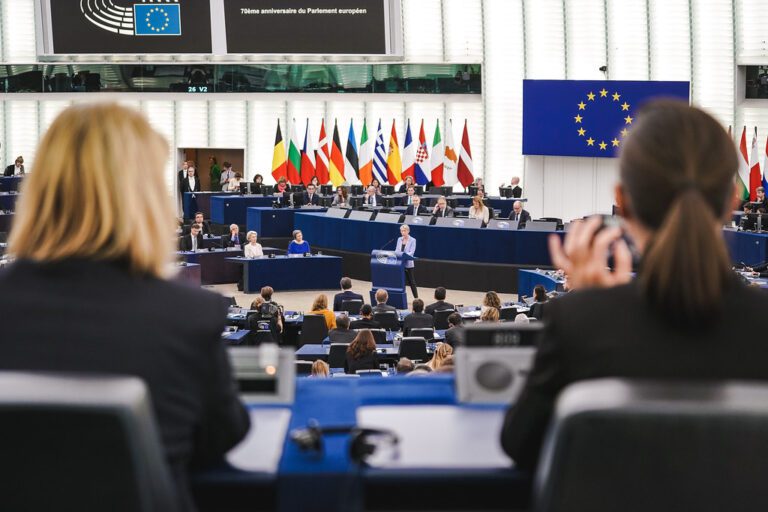
This article was originally published by Visegrad Insight and is republished here with permission.
Poland’s new government has been constituted, marking a “new opening” for Warsaw’s foreign policy, including on China – a country whose industrial policy, security orientation and strategic alignment with Russia all have a direct impact on Poland and the EU.
The new Polish government will likely have to first focus on the immediate problems it faces, such as reversing the democratic backsliding from the previous administration’s changes to the judiciary as well as the controversial indoctrination of the public broadcaster, to name but a few, yet for its long-term strategy, it should not underestimate the scale of China’s challenge to Poland’s competitiveness and the resilience of the whole continent.
In this regard, Warsaw is capable of bringing a new quality to the European debate on China, provided there is enough political will to tackle the problem head-on and bring the local sensitivities into the European mainstream.
New MFA – New Window of Opportunity
Poland’s MFA will now be led by Radosław Sikorski, a seasoned diplomat, former minister of foreign affairs and defence, as well as a long-standing member of the European Parliament. Sikorski has been credited with the authorship of the European People’s Party’s Position Paper on China; a document published in September 2020 to highlight the emerging consensus on the need to rebalance the EU’s approach towards Beijing.
The paper reiterated that maintaining a three-pronged outlook on China is necessary, with the government in Beijing seen as not only a cooperation partner but also a systemic rival and economic competitor.
It also acknowledged China’s increasingly malign behaviour in the EU, including its targeted influence operations and disinformation campaigns, as well as its authoritarian turn at home, with the crackdown on individual freedoms and the imposition of the national security law in Hong Kong serving as a case in point.
If one sees the EPP’s position paper on China as a proxy for Sikorski’s views on Beijing, they can be summarised in the document’s own words: “cooperate where possible, compete where needed, confront where necessary.” While these words sound promising as a basis for developing a more realistic policy towards China, the scale of the challenge seems to remain underappreciated in Poland.
Given the number of problems the new government will have to face both domestically and internationally, with the war in Ukraine remaining key to Poland’s security, Warsaw’s China policy will likely remain low in the hierarchy of political priorities, at least in the short run. And while the threat posed by Beijing appears less immediate and direct, it should not be underestimated.
Shifting Priorities, Long Way to Go
In Central and Eastern Europe, including Poland, China for many years has been either portrayed as a country that is allegedly “impossible to comprehend” due to its civilisational and geographical distance from Europe or idealised as a potential game-changing economic partner.
Because of that mindset, there has been little strategic thinking when it comes to designing any long-term policies towards Beijing. Warsaw’s policies have been largely reactive, guided by perceived potential opportunities and immediate challenges.
The past decade was a true rollercoaster for Poland-China relations, with a period of close bilateral and multilateral exchanges (via the infamous 16+1 framework for cooperation between China and Central and Eastern Europe), followed by a gradual cool-down in the Trump era and during the pandemic.
Beijing’s tacit approval of Moscow’s aggression against Ukraine was, to a certain degree, a game changer, with many political elites acknowledging that China’s ambitions to reshape the existing international order might have consequences that transcend geographic borders.
Nevertheless, China has continued to rank low in the hierarchy of importance of Polish foreign policy, with Beijing’s revisionism under Xi Jinping seemingly detached from the everyday problems of Poles.
The prospect of a conflict over Taiwan, Beijing’s close relations with Moscow and their long-term implications for Ukraine’s security, or the impact of Chinese industrial policy on the competitiveness of the European economy do not occupy many minds. Meanwhile, the scale of issues related to China’s growing role and ambitions is only increasing, and quite a few of them affect the situation in Poland: from Sino-Russian cooperation and its impact on war, through access to critical raw materials, to the growing competitiveness of Chinese technologies and brands, which may threaten European producers, including from Poland.
Beijing has also been increasingly active in extending its influence over physical infrastructure of strategic importance. One of the recent examples that made the headlines in Poland is the case of the Gdynia Container Terminal, ran by a firm with links to the Chinese state.
The deal has been controversial given how important the port in Gdynia is for NATO’s eastern flank and how this could be potentially exploited by the authorities in Beijing. The list of problematic issues goes on, with China having a track record of information manipulation in the Polish media sphere, for example, by supporting Russia’s position on the war in Ukraine.
Germany’s New China Strategy – What Does It Mean for Poland and the EU?
Meanwhile, the EU is indeed becoming much more assertive towards China, but this has not yet translated into a full-fledged strategy that could be accepted in all European capitals. Different states display varying degrees of concern vis-à-vis Beijing, with all eyes currently set on Berlin.
Germany’s long-awaited China strategy, published in July 2023, is widely seen as a potential blueprint for “new” EU-China relations, yet its future implementation has been widely questioned. The document sets out the main directions of changes in Berlin’s policy towards Beijing: from increasing cybersecurity and protection of critical infrastructure, through industrial policy, to building new global partnerships in the face of a revisionist China. Its scope signals the end of “Germany’s China illusion”. How did Berlin get here, though?
Germany under Angela Merkel was the driving force behind the development of Sino-European relations: it was the idea of “change through trade” (“Wandel durch Handel“) that legitimised the belief that economic and trade ties could be separated from the political dimension of cooperation with authoritarian Beijing, or even translate into some form of opening-up to democratic values.
Several decades later, China has not liberalised. Quite the contrary: Chinese authorities are now weaponizing economic ties with countries overdependent on trade with China to achieve their political goals. Moreover, the Chinese economy has become much more inward-looking and protectionist, favouring domestic firms over foreign investors and leading to many of them leaving the country for good. Even in sectors where Germany was long known as a world leader, such as the automotive industry, Chinese manufacturers are now undercutting German champions.
Simultaneously, China is becoming much more ideologically driven, with the primacy of security interests underscored across the system, and translating into growing surveillance and crackdown on civil society. In the words of the German China strategy, “China has changed. As a result of this and China’s political decisions, we need to change our approach to China.”
These processes pose serious challenges not only to individual EU member states but also to European democratic security more broadly. How Germany copes with this new reality will determine not only the future of its economy but also the ability of the entire EU to remain competitive and politically attractive.
The implementation of Berlin’s China strategy will function as a litmus test of European willingness to change the status quo of EU-China relations. Although Germany’s degree of dependence on China is higher than that of most other EU countries, Berlin’s dilemmas are largely universal.
If European resilience is to be maintained in the long run, all EU member states must deal with similar problems, which all have an inbuilt “China component”. Those include the green transition, providing attractive conditions for the development of innovations, fighting disinformation and maintaining the rules-based international order. These elements are directly related to policy towards China, both at the EU and national levels.
Moving Ahead: Creating momentum for Polish and European Policy towards China
The discussion about the strategic turn in European policy towards Beijing is only just beginning. Most EU countries do not have their own strategies towards China, and their policies are reactive, responding to direct threats, such as the pandemic or the war in Ukraine, instead of setting long-term goals.
There is still a lack of in-depth understanding of the intentions and strategic interests of the government in Beijing. This diagnosis is also applicable in Poland. With some exceptions, the Polish debate on China seems suspended in the constant “here and now”: foreign policy is usually envisioned with immediate gains in mind.
Meanwhile, political will is needed more than ever to respond to the kind of challenge China currently poses to European resilience. It needs to be coupled with in-depth analysis and scenario-building, reflecting different potential future trajectories.
Those could be determined by Beijing’s strategic choices regarding cooperation with Moscow (either strengthening current levels of cooperation or going beyond them, which would impact the situation in Ukraine), the future of Taiwan (peaceful or not), and the future of China’s economy (with the current slowdown influencing global markets), just to name a few.
Future expectations of a potential Republican president in Washington towards Europe should also be taken into consideration, as they might exert additional pressure on Brussels to act decisively vis-à-vis Beijing.
Poland has the potential to actively co-create European policy towards China, to shape its direction and to bring a new perspective to it. With the new government being formed in Warsaw, this “new opening” should be exploited so that Poland becomes more involved in the process. Although the “China challenge” might still appear too distant, it is better to prepare ahead of time and not be caught off guard if the political reality exceeds our expectations.
Written by
Alicja Bachulska
a_bachulskaDr. Alicja Bachulska is a Research Fellow at CHOICE and Policy Fellow at the European Council on Foreign Relations where she focuses on Chinese foreign policy and China-EU relations.

